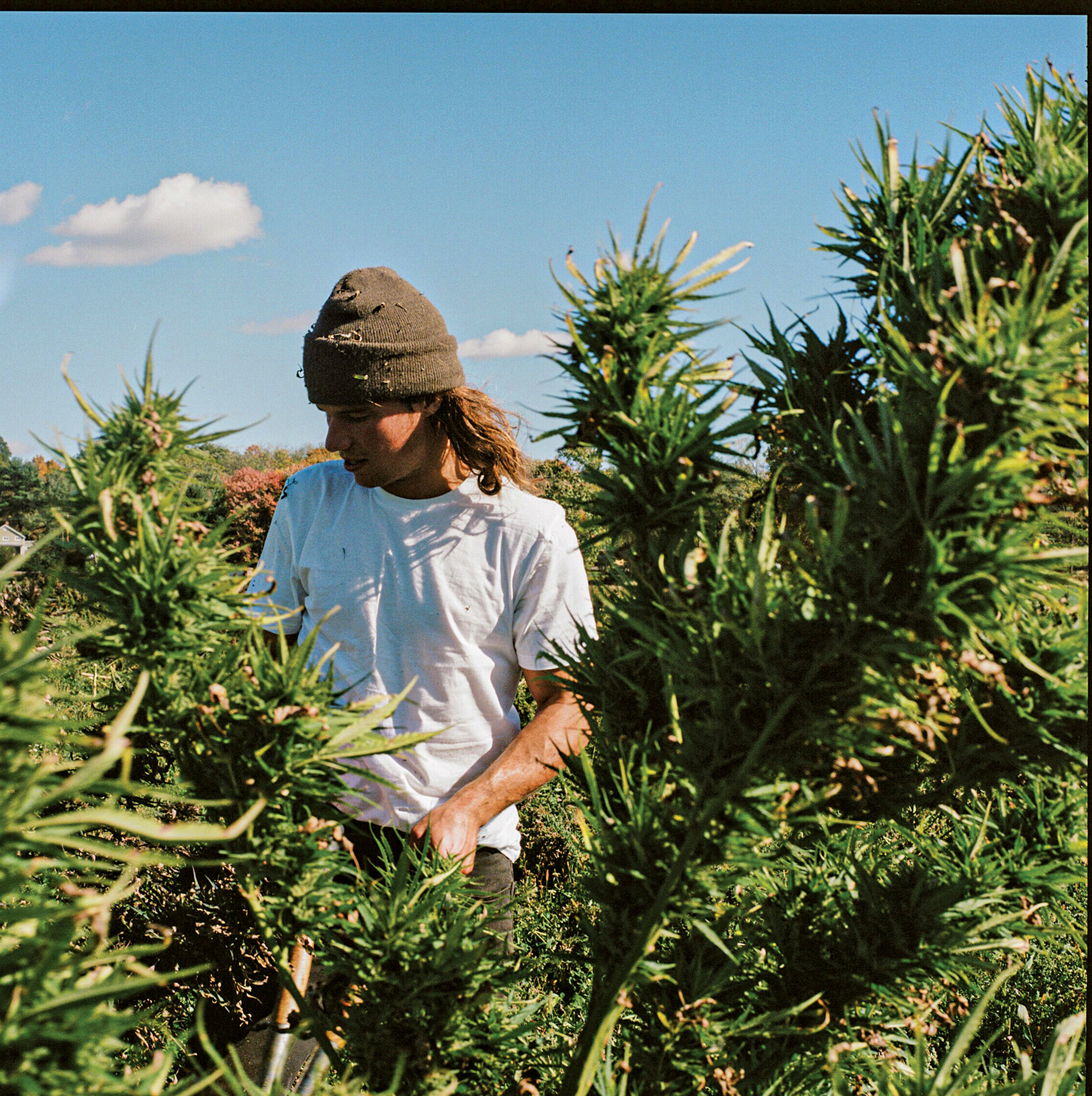HARVESTING HEMP
A NEW GENERATION CARRIES ON A FAMILY TRADITION OF FARMING
May 15, 2021
Photographs and Story by Jake Borden
DRIVING DOWN a meandering dirt road in Sheffield, past foggy fields and 18th-century farmhouses with sagging porches, I arrive at a large green gate by a field of salad greens. One could be mistaken for thinking they had stumbled across a clandestine military site by the eight-foot fence stretching off into the mist and the “No Trespassing” signs lining its perimeter. Once through the gate, I spot a familiar face, Ted Dobson, who is pushing a rototiller on the other side of a field of knee-high rows of cannabis. He is buffeted by two large greenhouses and a half-dozen workers busily tending the plants.
Sisters Freya and Melany Dobson at Old Mud Creek Farm, where hundreds of acres of hemp are grown and harvested.
It’s a rainy afternoon and we’re standing on Arrow Cultivate, formerly Equinox Farm, 12 acres of land which once provided heirloom tomatoes, mesclun, specialty, and micro greens to the Berkshires, Litchfield County, Boston, and Manhattan’s finest restaurants. Ted has been farming in Columbia and Berkshire counties since the early 1980s, bringing his produce to market in New York City and offering his bounty to local eateries. While he’s hesitant to admit it, Ted was largely responsible for the farm-to-table movement that began in the Berkshires and has since swept across the country. “If it hadn’t been me it would have been someone else because the timing was so good. I don’t know who else was out there pounding the pavement. I went to 50, 60 restaurants at that time. I would say, ‘from my farm to your table.’ ”
After nearly four decades of farming in the Berkshires, Ted replaced his tomatoes and greens for cannabis in 2019, cultivating for Theory Wellness in Great Barrington. “Farming is a really tough way to make a living,” he says, leaning back in his chair in a makeshift office. “Raising four kids and keeping up with a middle and working class, I wanted to send my kids to good schools and college, put good food on the table and keep the lights on. I had never farmed more than 12 acres, which meant coming up with a ton of greens every week, year in and year out. There was more and more competition and more and more pressure.” Ted recognized what he calls a “once-in-a -century cash crop” and switched his fields over to cannabis as soon as it became legal. This has allowed him to maintain his livelihood, keep working the land, and share in the tradition of farming with his children.
A few miles over the Massachusetts border, Ted’s son, Ben, manages Old Mud Creek Farm. The sprawling, 525-acre tract of land, set against the skyline of the Catskills, is owned by ecologist and feminist Abby Rockefeller, eldest daughter of David Rockefeller and Margaret McGrath. Ben took after his father, starting his own organic vegetable farm at the age of 16 in the Berkshires, then a coffee import business from Haiti and onto repairing waterways in the Dominican Republic. He returned to the region in 2012, where he was introduced to Abby. She hired Ben to work at her family’s Old Mud Creek and Stone House Grain farms to lead a transition from a conventional farming system to a regenerative and organic one.
In 2015, Ben and Abby co-founded Hudson Carbon, an ambitious project to measure the carbon cycle of the land. They developed what they consider to be international best practices for carbon sequestration. All this is predicated on a regenerative farming movement which aims to offset the effects of climate change by capturing carbon from the atmosphere and rotating crops to maintain healthy soil. It’s a high-tech approach to dirt. Soil samples are collected regularly and processed in an on-site lab, while atmospheric instruments take daily measurements of CO2 levels in the fields, measuring which crops are having the greatest impact.
Ben’s advice for success as a modern farmer is to forget being sentimental. “Be good at farming, and be ready to change what you grow. We often make a cultural attachment to something that was really a passing point in agriculture, and we need to be able to adapt.” In 2017, he took his own advice and planted a small field of hemp—one of the best crops to sequester carbon—and from that Hudson Hemp was born.
What’s good for the planet can also be good for business; the global hemp industry is expected to surpass $5 billion in 2021. The fibrous plant, once a staple in New England’s fields and the backbone of the shipping industry, has made a resurgence after years of prohibition. Each acre can sequester over 10 tons of carbon. Old Mud Creek Farm produces up to 75 acres of hemp a year, depending on the cycle, and has been rapidly developing a line of products derived from the yield.
Shortly after the creation of the company, the family tradition became a family business when sisters Freya and Melany Dobson joined the team. They developed a line of CBD formulas called Treaty, using the calming, non-psychoactive compound found in hemp.
Freya describes how the surrounding fields and forests informed the chemical make-up of each product: “Drawing from the bioregion of the landscape, using ingredients that come from the farm, we worked diligently to make formulas that worked at the molecular levels, using botanical extracts for targeted effects. We wanted to reimagine what a luxury or designer product from a farm looks like. How do you craft something that’s beautiful that somebody wants to have in their bag and is exciting to take out? We worked really hard at creating a brand that emulated all of our values, while using zero waste packaging.”
Hemp plants are harvested from late August through October, dried, processed, and extracted in yet another high-tech lab located on the property. It’s there that it is hand-packaged and shipped.
In the years since Hudson Hemp’s creation, hemp has gone mainstream. Treaty can be found on shelves from the Berkshire Food Co-op in Great Barrington to Standard Dose in New York City, and Fred Segal in Los Angeles. Hudson Hemp has sold its fibers to fashion designers who are incorporating hemp into their product lines as consumers become more ecologically conscious. “We want to shift the values of luxury, which as of now are irrelevant to our generation,” says Melany over a plate of salad greens and fried chicken at the Prairie Whale, her eyes lighting up. “What if luxury meant designs from a farm? What if ‘designer’ meant that you knew how it was grown while sequestering carbon? What if that was sexy? Because it is.”
Melany remembers a time when this wasn’t her own view. Growing up harvesting and packing orders on the farm, she did not want a lot to do with farming—it wasn’t until high school that she started to see it as cool.
Making farming cool is a long-held sentiment that the Dobsons hope to share with others. Apart from a dazzling line of regeneratively derived products, they’ve opened Hudson Hemp (hudsonhemp.com) to tours and performances, offering the landscape as a canvas to be shared by the community.
“Our culture is so affected by our farming practices,” says Melany. “It’s very unconscious how we interact with food, fiber, fuel and medicine. We are so disconnected from it. We wanted to bring a sense of culture to the farm in a very literal way. That’s where dancing, photography and art becomes a translation of the word ‘agriculture.’ ”
On top of a small hill at the farm is the Pollinator Pavilion, where garden parties, dance performances and farm tours are hosted for all to attend.
At the center of the farm, atop a small hill surrounded by sunflowers and rows of hemp, sits a large, white geodesic dome that would look at home in the MoMa. Called the Pollinator Pavilion, the beehive structure doubles as a performance space, overlooking the Catskills. This is where garden parties, dance performances and farm tours are hosted for all to attend.
“It’s totally interactive; we invite people to go inside and play. It’s also in a beautiful part of the farm,” explains Freya. “It’s a great teaching tool to explain how pollinators are essential to the food system and contribute to it.”
A 45-minute drive back to Sheffield, I walk through a field of cannabis and wildflowers with Ted. He looks out over his crop and reminisces on his years of farming and what it means for his children to carry on the tradition.“The fact we work in the same field speaks volumes to how close we are as a family. I’m so happy that they get it and want to do this type of work.”








